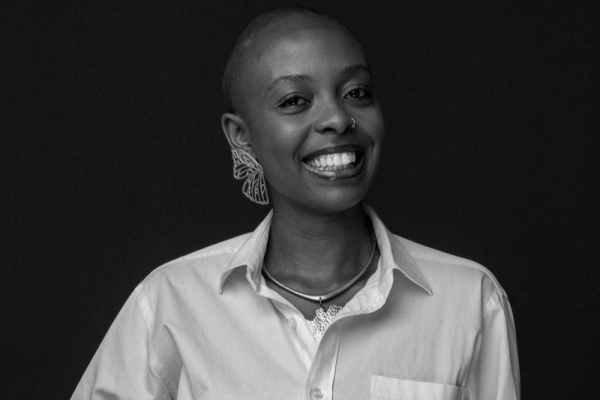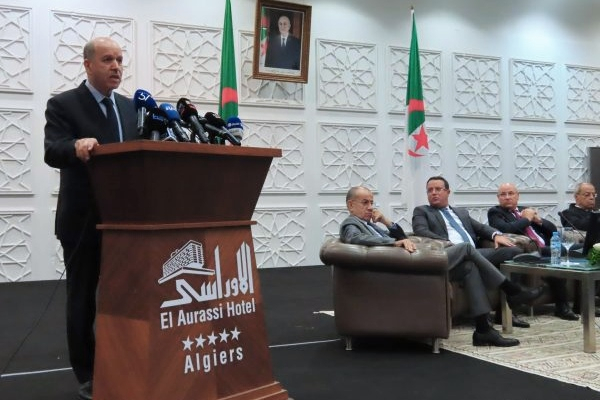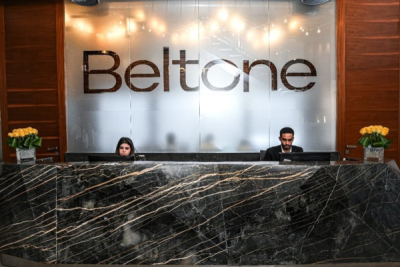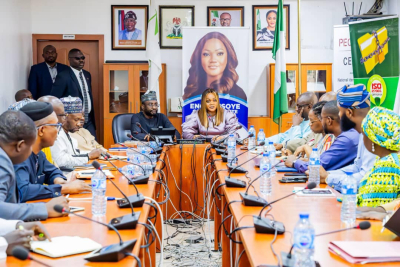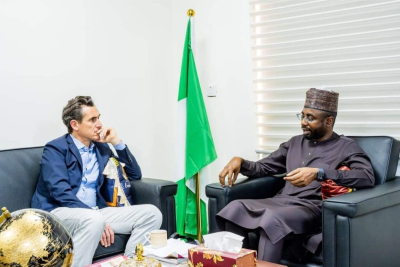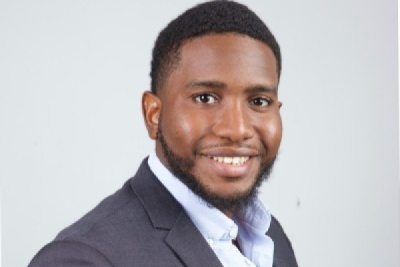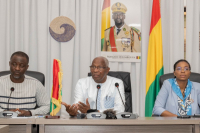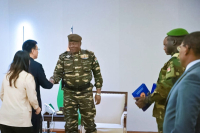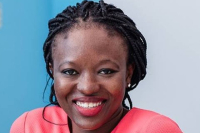She is dedicated to bridging the health gap for women. Her leadership and the impact of her company have earned her several awards and recognitions.
Berabose Aline Joyce, a tech entrepreneur from Rwanda, is the co-founder and CEO of Luna, a startup that offers digital health and wellness services for women across Africa. As Berabose described in 2023, Luna serves as a secure community platform where women can access reliable and safe products and services. Launched in 2022, Luna enables women to anonymously engage with other women and experts on key topics such as mental health, sexual and menstrual health, and maternity. Its mission is to simplify women’s access to trusted health specialists.
Luna’s primary services include Luna Health, a platform for consultations with certified doctors, and Luna Shop, an e-commerce platform that provides essential health and wellness products for women.
Before Luna, in 2016, Berabose Aline Joyce co-founded the African Dream Movement, a Pan-African organization dedicated to sustainable development and people’s well-being, where she served as the program director until 2019.
Berabose Aline Joyce completed her bachelor’s degree in Business and International Relations from Kigali Independent University in 2023. She also earned a diploma in Gender Studies, Menstrual Equity, Hygiene, and Management from the Clinton Global Initiative University in 2021.
She embarked on her professional journey in 2017 at AC Group Rwanda, a firm offering smart and interactive IT solutions, where she held the position of a marketing manager. In 2020, she transitioned to a consultant role for the Westerwelle Startup Haus Kigali incubator, powered by Evonik Stiftung. Her diverse career has seen her traverse multiple fields. In 2021, she took on the role of Head of Strategy at Right Venture Creative, a creative and communication agency.
In addition, she serves as the CEO of Kunda Eco — Arts Space, a company that creates and promotes recycled art and craft objects in Rwanda. In 2022, she joined Simbuka Technological Innovation, a social enterprise specializing in water-related technologies and solutions.
Berabose Aline Joyce’s exceptional leadership has been recognized widely. In 2023, she was named among the 32 Rwandan women changemakers, and in 2024, she received the prestigious Women in Leadership (WIL Award) in the health and wellness category.
Melchior Koba
The Algerian government adopted a pharmaceutical and industrial policy aimed at making this sector a strategic pillar of the economy, capable of generating wealth. To achieve its ambitions in that sector, it implemented several initiatives.
Algeria’s Health Minister, Abdelhak Saihi, announced on Monday, April 22, the country’s plans to launch a digital platform dedicated to managing community pharmacies nationwide in the coming months. The announcement was made during the opening ceremony of the 17th national symposium of the Algerian National Union of Community Pharmacists (SNAPO).
According to Saihi, the platform “will establish a new, modern, efficient, and transparent mode of managing all aspects related to community pharmacies, thus contributing to the prevention of self-medication and the control of the traceability of psychotropic drugs, while anticipating shortages and stockouts of pharmaceutical products.”
The development of this platform is being supervised by a committee that includes the General Directorate of Pharmacy and Equipment of the Ministry of Health, the Order of Pharmacists, and SNAPO. This initiative is part of the Health Sector Digitization Strategy, which aims to digitize all its aspects, including pharmacy management.
The platform will act as a dashboard for managing pharmacy activities across the country, facilitating the digital management of drug availability, duty rosters, and the traceability of psychotropics and antibiotics. It will also help anticipate shortages and stockouts of pharmaceutical products, thereby ensuring better access to medications for the population. The platform will also enable authorities to identify pharmacists who are practicing unlawfully.
According to the latest figures from SNAPO, there are currently 12,500 community pharmacies distributed across the country, equating to one pharmacy per 3,000 inhabitants.
Samira Njoya
In 2023, there was a noticeable downturn in fundraising for African startups compared to the previous year. However, to counter this trend and foster recovery, various supportive initiatives for these businesses are currently being implemented.
Egypt venture capital firm Beltone Holding, announced a partnership agreement between its subsidiary, Beltone Venture Capital (BVC), and CI Venture Capital, a subsidiary of Abu Dhabi-based investment management company Citadel International Holdings, on Wednesday, April 17.
The collaboration aims to manage a $30 million fund dedicated to investing in promising startups in the Middle East and North Africa (MENA) region. “The Fund will typically invest in pre-seed and seed funding rounds and will continue to support the best-performing portfolio companies in follow-up rounds; in addition to potentially investing in attractive opportunities at different funding stages,” said Ali Mokhtar, CEO of Beltone Venture Capital.
The launch of the fund aligns with the shared ambitions of the two companies to support the expansion of startups and stimulate innovation in the MENA region, with a focus on high-margin sectors and exponential growth driven by technology.
The fund is expected to bolster support for young businesses in the region. In recent months, the fund has started investing in leading startups such as Bosta, Trella, Qlub, and Ariika. According to data from the specialized platform Africa the Big Deal, startups in the MENA region raised $254 million in March, bringing the total for the first quarter to $429 million.
Samira Njoya
Collaborations to enhance digital adoption and growth are crucial for Africa's economic advancement, modernizing infrastructure, fostering innovation, and promoting secure data exchange, among others. These partnerships facilitate seamless digital interactions, unlocking economic potential, and contributing to inclusive growth and prosperity in Africa.
The National Information Technology Development Agency (NITDA) and the National Identity Management Commission (NIMC) have unveiled a strategic partnership to address challenges in identity management, payment systems, and data exchange. This collaboration, in alignment with President Bola Ahmed Tinubu’s Renewed Hope Agenda, was announced on April 17 by NITDA on X (formerly Twitter).
“Today, we have agreed to set up a technical working crew to look at how we can harmonize and implement national public key infrastructure, how we can work together to build the Nigerian DPI stack, how we can work together on the data exchange platform and to strengthen our enterprise Architecture across MDAs to give a 360 view of all government investments in IT,” said NITDA Director-General Kashifu Inuwa Abdullahi.
This partnership focuses on integrating Public Key Infrastructure (PKI) and Digital Public Infrastructure (DPI) to enhance data security and enable seamless digital exchanges in Nigeria, fostering innovation and economic growth across sectors within the country's digital landscape.
The collaboration between the two agencies is contributing to efforts to digitize public administration. The UN E-Government Survey 2022 revealed that Nigeria ranked 140 out of 193 countries, with an E-Government Development Index (EGDI) of 0.4525, indicating its readiness to utilize information and communication technologies for public services.
While Nigeria's EGDI falls below the global average of 0.5824, it marks a slight improvement from its 2020 ranking of 141. The E-Government Development Index (EGDI) gauges a nation’s preparedness and ability to utilize information and communication technologies for the provision of public services.
The initiative marks a significant step forward in Nigeria’s digital journey, signifying a transformative era for the nation’s digital economy and societal progress. It is expected to bring about a paradigm shift in the way digital interactions are conducted in Nigeria, paving the way for a more secure and efficient digital future.
Hikmatu Bilali
The Director-General of NITDA, Kashifu Inuwa Abdullahi, recently hosted Dr. Matteo Prosperi and Roland Ruhumuriza, respectively CEO and Africa Area Manager of De Lorenzo SpA, at the agency's Abuja headquarters, NITDA announced on its Facebook page on April 16.
The meeting centered on discussions regarding potential partnerships and collaborations aimed at bolstering Nigeria's digital economy.
Upon concluding his academic journey in Canada, he made his way back to Côte d’Ivoire, fueled by a vision to transform the agricultural landscape of Africa. His technological innovations in this realm have earned him numerous accolades and honors.
Aboubakar Karim is an Ivorian agroeconomist and entrepreneur. He is the co-founder and CEO of Investiv Group, dedicated to developing innovative solutions to support small-scale farmers in Côte d’Ivoire and throughout West Africa. Founded in 2017, Investiv Group specializes in precision agriculture and the use of drones in the agricultural sector. "With Investiv, we aim to contribute to building the future of African agriculture by focusing on digital transformation and precision agriculture tools," the entrepreneur says.
The startup's services are diverse, including mapping, phytosanitary diagnostics, and aerial spraying, all performed by drones. It also offers customized software solutions to its clients. Its clear goal is to help farmers reduce losses due to phytosanitary issues, precisely monitor the condition and size of their lands, and conduct essential technical studies for their agricultural projects.
In addition to his entrepreneurial commitment, Aboubakar Karim is the founder and director of the Côte d'Ivoire Flying Lab, an initiative affiliated with the We Robotics Organization. This community promotes the use of drones, robotics, and STEM for development and youth empowerment.
Karim graduated from Laval University in Canada in 2016 with a bachelor's degree in agricultural economics. His professional career began in 2016 at the Ministry of Agriculture, Fisheries, and Food of Quebec, where he was an agroeconomist in the agri-food marketing and regional development service. Between 2021 and 2022, he worked as a business analyst at the Society for Cooperation for International Development (SOCODEVI) in Canada.
His innovations have earned him several distinctions, including the third prize in the African Startup Competition organized by Ecole Polytechnique de Paris in 2018, and a place in the top 10 of Africa's Business Heroes in 2020.
Melchior Koba
For many African countries, digitizing administration is the key to unlocking good governance, efficiency, and a more prosperous future.
Guinea’s progress in digitizing its public administration has been sluggish, a situation lamented by Prime Minister Bah Oury during a workshop on Saturday, April 20. The workshop, attended by several government officials, focused on streamlining the digitization of public services and enhancing communication between the administration’s digital platforms.
Oury attributed Guinea’s lag in part to a lack of cognizance of the swift advancements in the field. He pointed to underutilized past investments, such as a $10 million optical fiber project along the Guinean coast, as an example.
According to the latest United Nations report, "E-Government Survey 2022: The Future of Digital Government," Guinea ranks 162nd out of 193 countries worldwide in terms of e-government administration. The country, with an index of 0.2955, falls into the group of nations with an average e-government development index. Guinea is still below the global average index of 0.6102. In 2020, the country ranked 158th, marking a regression of four places.
In response to these deficiencies, The Prime Minister called for the removal of all obstacles hindering efficient computer systems in public administration, according to a statement from the Prime Minister's office.
On the technical front, the Ministry of Posts, Telecommunications, and Digital Economy is already making strides towards the swift modernization of public administration. The Republic of Guinea’s digitalization strategy, spearheaded by the national digitization agency, ANDE, is currently in the drafting stage. By 2026, it aims to digitally transform the Guinean administration, ensuring the sustainable development of digital technology that yields social and economic benefits for citizens and both the private and public sectors.
Samira Njoya
The solution was sparked by its founder’s personal experience. In 2014, during her 30th week of pregnancy, she underwent an emergency C-section due to complications. While fortunate to recover, this near-death experience from postpartum hemorrhage fueled her desire to develop a solution.
Nerve, an e-health mobile application, is the brainchild of the Nigerian startup LifeBank. It provides a platform for hospitals and health centers to order vital medical supplies like blood and oxygen. LifeBank, headquartered in Lagos, was established in 2016 by Temie Giwa-Tubosun.
The founder explains, “We are using Google Maps to create a communication platform between blood banks, hospitals and patients, which was previously non-existent. [...] I knew from the start that donors would always be an essential link in the distribution process. Without supply, what can we deliver?”
The app, available on iOS and Android, has already been downloaded over a thousand times. It connects blood banks with various hospitals and health centers. Users place orders through the app, specifying the required blood group, and the system takes care of the rest. LifeBank maintains a cold chain infrastructure to ensure the blood is properly preserved until it is delivered within 45 minutes or less.
The startup elaborates, “We work with over 150 accredited blood banks to provide safe blood and safe blood products. Our order and inventory system ensures that every product supplied is trackable and the safety records of blood and blood products are available to patients and health providers.”
Regarding oxygen supply, the startup asserts, “We work with over 50 oxygen plants to ensure that we only source and deliver high-quality medical oxygen.”
LifeBank uses various modes of transport for delivery, depending on the situation. These include bicycles, tricycles, trucks, and even drones. In March 2023, the healthtech incorporated artificial intelligence into its system to enhance its performance.
Adoni Conrad Quenum
Over the past two decades, Niger and China have built strong bilateral relations across various sectors. This collaboration has recently gained momentum in the digital domain.
The People’s Republic of China is ready to partner with Niger in the digital sector, indicated Jiang Feng, China’s ambassador to Niger, during a meeting with Brigadier General Abdouramane Tiani, the president of Niger’s National Council for the Safeguard of the Homeland (CNSP), on April 18.
Jiang Feng was joined by Zhou Jian, the Director General of China’s Emergency Cyber Response Team for Industrial Control Systems and a special representative of the Chinese Minister of Industry and Information Technology. The Chinese diplomat highlighted China’s position as the largest developing country with a highly advanced digital economy and its intent to closely collaborate with Niger, a fraternal nation, to foster its growth in the digital domain.
“China, as the largest developing country with a highly developed digital economy, intends to conduct very close cooperation with Niger, a brotherly country, to develop it in the digital field in order to promote the already excellent bilateral cooperation to a new level for the benefit of our two nations,” he said.
The meeting between the two politicians was held on the sidelines of the first edition of Semaine du numérique (Senum24) organized by Niger under the theme “le numérique et la souveraineté ( Digital and Sovereignty)”. The event aims to discuss mechanisms, solutions, and initiatives to address challenges related to digital transformation in the country.
During the meeting, Jiang Feng expressed his satisfaction with this theme, which he considers a demonstration of the CNSP's will and determination to give paramount importance to this sector in the socio-economic development of the country.
Samira Njoya
After leaving her position at a bank in Ghana, she decided to devote her energy to entrepreneurship. She is driven by a vision of equal access to technology for all, both men and women alike.
Regina Honu (photo), née Agyare, is a Ghanaian computer scientist and social entrepreneur. She is the founder and CEO of Soronko Academy, which she started in 2017 to introduce women and young girls to the intricacies of technology. The academy offers specialized training in coding and digital skills, with a particular focus on women and girls. Its main goal is to narrow the gender representation gap in the tech field across Africa. To date, Soronko Academy has trained over 20,000 women and girls and has expanded its outreach to include boys, men, and disabled children.
Soronko Academy is a project of the Soronko Foundation, a non-profit organization established in 2012. It was created to support the development of initiatives like Tech Needs Girls, a mentorship program of the foundation aimed at teaching coding and technology creation to underprivileged girls aged 6 to 18.
The academy offers a range of technical courses, including computer science, web development, and mobile applications. Besides technical skills, it also provides training in entrepreneurship, leadership, and presentation techniques, among other non-technical skills.
Regina Honu graduated from Ashesi University in Ghana, where she earned a bachelor's degree in computer science in 2005. After her studies, she worked as the manager of information systems and director of research at Fidelity Bank Ghana from 2008 to 2012.
Honu’s dedication and innovative approach have earned her numerous accolades. In 2017, the BBC included her in their list of the 100 most inspirational and innovative women. In 2022, she was honored with the Ghanaian Woman of the Year award for her outstanding contributions to the technology sector.
Melchior Koba
More...
Africa remains the region of the world where health challenges are most critical. Thus, e-health represents an opportunity for the development of the sector, particularly due to the high mobile phone penetration rate on the continent and its widespread use.
On Thursday, April 18, the International Committee of Digital Health Experts in Africa (CEISNA) announced a partnership with the Higher Institute of Medical Techniques of Lubumbashi (ISTM) in the Democratic Republic of Congo. This agreement aims to promote digital health in Africa.
"This agreement marks a decisive step in the promotion of digital health in Africa, by uniting the efforts of CEISNA and the Higher Institute of Medical Techniques to improve healthcare access through cutting-edge technologies," CEISNA stated in a press release.
As part of this partnership, CEISNA will bring its international expertise in digital health to enhance the capabilities of the Higher Institute of Medical Techniques in the areas of training, research, and implementation of innovative health solutions.
This collaboration is part of CEISNA's efforts to promote e-health education in African universities. Earlier in April, the committee also announced a partnership with the Higher Institute of Public Health in Bamako aimed at improving health systems in Mali through digital technology.
These partnerships come at a time when African governments are increasingly looking to leverage innovative technologies in the healthcare sector. It is becoming urgent for Africa to massively develop systems incorporating artificial intelligence techniques to significantly improve care and provide effective responses to some difficult and rare diseases. According to a report by Fortune Business Insights, the global digital health market is expected to reach $559.52 billion by 2027.
Samira Njoya
Convinced of the growth potential of e-commerce in Africa, he is considering ways to contribute to the emergence of this sector. He is developing a technological solution with his friends to make life easier for e-commerce merchants.
Walid Laribi (photo) leads Maystro Delivery, an Algerian startup that helps e-commerce businesses reach their objectives by taking care of their logistics from start to finish.
Maystro Delivery, founded in 2019 by Walid Laribi, Lagrid Abdelhalim, and Hebbar Walid Choukri, is a digital platform that links e-commerce store owners with delivery staff. Its main goal is to manage delivery logistics for its partner firms, freeing them to concentrate on their primary operations.
The company, with branches in Algeria and Tunisia, has a workforce of over 500 people and runs 16 warehouses throughout the region. With the support of research and development teams, it aspires to be the go-to logistics provider for e-commerce in the region. Its delivery solutions have already been adopted by over 2,000 businesses.
Walid Laribi earned an information systems degree in 2013 from the National Higher School of Computer Science in Algeria. He gained experience through internships at Inode, an Algerian firm specializing in Linux solutions, and GPCdz, a company focused on processing geographical data.
In 2012, he took on the role of director of the Google Developer Group in Algiers. He joined Nokia as a Network Operations Center (NOC) engineer in 2014 and transitioned to a presales engineer role the next year. He was promoted to sales solutions manager within the same company in 2017. In June 2020, he chose to fully commit to Maystro Delivery, leaving his position at Nokia.
Melchior Koba
Last-mile delivery is experiencing rapid growth in Africa. This segment is bolstered by the rise of e-commerce on the continent, with local tech entrepreneurs offering increasingly tailored solutions to African populations.
Yoboresto, a food delivery solution created by a Gabonese startup, enables users to order from a variety of restaurants in Libreville via a mobile application. The delivery time ranges from 40 minutes to an hour, depending on the distance between the restaurant and the delivery location. Founded in 2018 by Anthony Marat, the startup operates in the city where it is based.
The application, is available on both iOS and Android, with the Android app already downloaded over 10,000 times per Play Store data. To register, users are required to complete a form with their first name, last name, phone number, email address, and password. Once registered, users can conveniently place orders from the startup’s partner restaurants from their home or office.
The platform provides a list of restaurants, but users also have the option to search for a specific restaurant by name using the search bar. If time is of the essence, users can search by neighborhood to find the nearest establishments or by the type of cuisine offered by the restaurants. For instance, a search for “African cuisines” will automatically filter out fast food, Chinese, or Indian restaurants.
Upon selecting a restaurant, users can view the menu, meal prices, opening and closing hours, photos of the restaurant, ratings (out of 5 stars), and comments from previous customers. Yoboresto ensures that all necessary information is readily available to aid users in making an informed decision between different orders or restaurants.
In addition to online food ordering, Yoboresto rewards its users with bonus points that can be redeemed for discounts at several establishments on the platform. A feature also allows users to make reservations at restaurants for lunch or dinner. For restaurant promoters, the startup has established a registration procedure on its platform, which requires the provision of certain details.
Adoni Conrad Quenum
A computer engineer, he is passionate about using technology to solve problems. He develops technological solutions and mentors young entrepreneurs.
Mohamed Amine Ouni, a Tunisian computer engineer and entrepreneur, is the founder and CEO of TrustiT. His company aids individuals and businesses in managing their electronic devices throughout their lifecycle.
TrustiT, launched in 2017 and available in Tunisia and Saudi Arabia, was launched to revolutionize the management of electronic equipment. Using eco-friendly methods and advanced technologies, the startup offers a comprehensive solution for managing these devices, from purchase to end-of-life recycling. This includes maintenance, repair, or refurbishment.
As Ouni explained in 2022, “The TrustiT project enables its clients, both individuals and businesses, to centralize their electronic device needs at a single location that offers comprehensive logistical support, optimization of technical choices between repairers and spare parts suppliers, and digital transparency with real-time tracking via the web client space or mobile app.”
At the forefront of technology, TrustiT utilizes artificial intelligence to track and assess the ecological impact of these devices. Its goal is to help businesses make environmentally friendly choices, aiding them in obtaining green certifications. In summary, TrustiT is working to reduce electronic waste and promote a sustainable lifestyle.
In addition to his role at TrustiT, Ouni serves as a growth strategy consultant at Hulool, a company specializing in service development in Saudi Arabia. He also acts as the international coordinator of Webdays, a series of events aimed at fostering interactions among participants from diverse ecosystems for economic and social development.
As a mentor at the Founder Institute incubator, Ouni imparts his expertise to budding entrepreneurs. He is also the founder of Sharek iT Tunisia, another company that manages electronic waste from old devices through a digital process that accepts donations from individuals and businesses.
Ouni boasts an impressive academic background. He graduated from the National Institute of Applied Sciences and Technology (INSAT) in 2009 with a bachelor’s degree in software engineering. He earned a degree in computer engineering and management in 2012 from the Ecole Supérieure Privée d’Ingénierie et de Technologies (ESPRIT) in Tunisia, and a master’s degree in business and small business operations in 2015 from the Graduate School of Business of Tunis.
In addition to his entrepreneurial accomplishments, Ouni has also taught at the Higher Institute of Technological Studies in Communications in Tunis, at SUP’COM, and at ESPRIT. From 2018 to 2020, he served as a consulting partner for North Africa at eleva8or, a virtual accelerator for tech startups.
Melchior Koba


